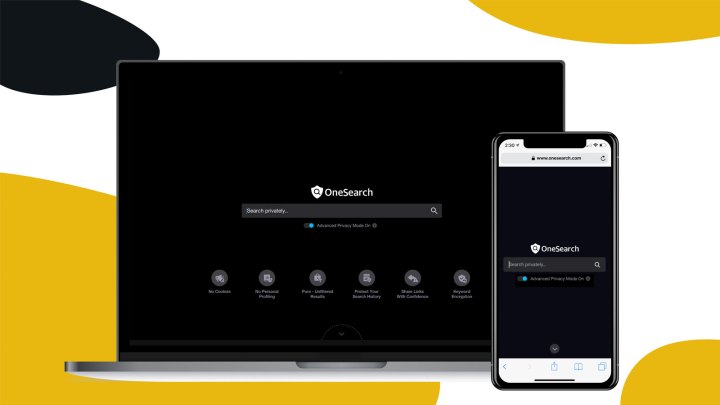
Verizon is looking to put some major security breaches behind it with a brand-new, privacy-focused platform called OneSearch. Built on a model that involves encrypting search terms, leaving results unfiltered, and not storing or transferring of any user information whatsoever, it’s going after the privacy-conscious web users of the world.
In 2020, the search engine market is both hotly competitive and not even remotely so. Google controls almost 93% of all searches, with Bing, Yahoo, Baidu, Yandex, and everyone else battling it out for scant shares of the remainder. Some of those, like DuckDuckGo, Qwant, and StartPage, hope to attract an audience by putting privacy first. They don’t track users, don’t sell their data, and don’t filter search results. Those are all features of Verizon’s new OneSearch platform as well, but it’s hoping that its polished product, and a few more features, will be enough to draw the privacy conscious away from their established searching patterns.
“We deeply believe in consumer trust and choice, both for our user community and our partners,” said Verizon’s head of consumer products, Michael Albers. “In support of our commitment to trust and transparency, we are excited to launch OneSearch, an innovative new online search experience built for privacy-minded searchers. With it, you can search the internet with increased confidence, knowing your personal and search data isn’t being tracked, stored, or shared with advertisers.”
While big data breaches at Verizon-owned companies like Yahoo don’t help encourage the view of Verizon as a good steward of its users’ data and privacy, OneSearch does appear to do just that. Anti-tracking tools like Ghostery and Malwarebyte’s Chrome extension found no nefarious trackers of cookies when we visited the site. That also helps make it exceedingly fast, which is always welcome from a search engine.
Other privacy enhancements include encrypting your search terms and even the links you click on. They also expire within an hour (when Advanced Privacy Mode is enabled) making it even harder for anyone to track down what you’ve been looking at online.
There are some caveats to all this. OneSearch does track location information like your IP address, using it to contextualize the search results. That IP is encrypted however, and after four days (it’s stored to prevent network traffic abuse, like DDOS attacks) it is permanently deleted. OneSearch is also supported by advertisements, but they aren’t based on collected browsing data or your past activity, merely on your use of the search terms at the time you used them to show relevant ads. They’re contextual, but not personal.
OneSearch leverages Bing to provide its search results, so if you like the service offered by Bing and find it an accurate search engine, then Verizon’s OneSearch might be a good alternative. It should be a more private experience, even if some of your data is shared with Bing to make the search results more accurate. You can rest assured, at least, that the only information making the jump to Microsoft’s engine is what was provided to the search engine at the time of searching, and not everything that you’ve done over the past few days, weeks, or even over the life of your account, as is the case with some search engines.
OneSearch is available globally on desktop, but is designed exclusively for North American users at this time. Verizon plans a rollout of the platform to global audiences in the near future, and there is also an impending launch of an official Android and iOS application later this month.
Editors' Recommendations
- This new Windows 11 feature will help you protect your passwords
- Microsoft Edge just got a new way to protect your privacy
- What’ll happen to your WhatsApp account if you don’t agree to new privacy policy
- Here’s why you should never trust those ‘privacy-focused’ email apps
- The Off-Facebook Activity tool lets you take control of your shared data




